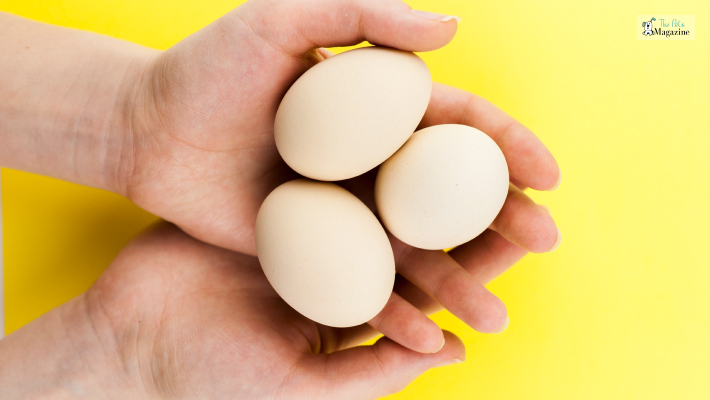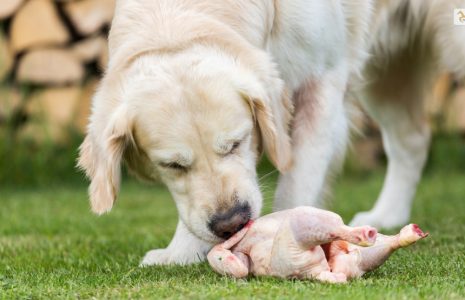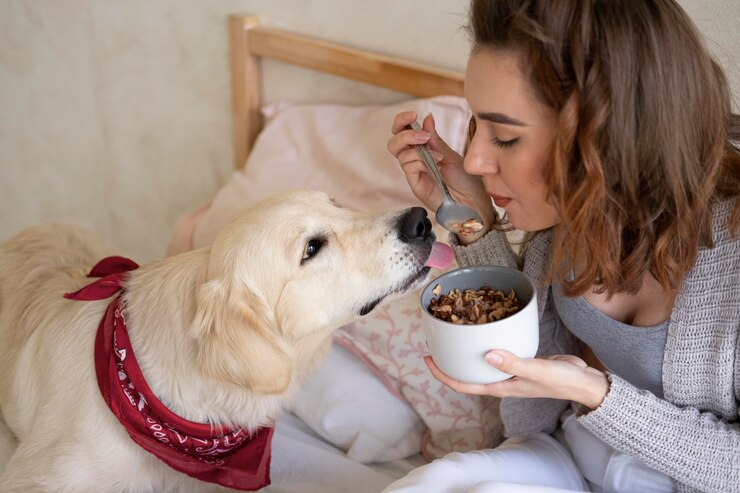Unveiling The Mystery Behind Can Dogs Eat Raw Eggs?


As a pet parent, it is natural to want to provide the best nutrition for your furry friend. You may have heard conflicting opinions about whether dogs can eat raw eggs. In this article, we will delve into this topic and uncover the truth behind the mystery of dogs and raw eggs.
Can Dogs Eat Raw Eggs? Debunking The Myths And Misconceptions

There are many myths and misconceptions surrounding the idea of feeding raw eggs to dogs. One common belief is that raw eggs can cause biotin deficiency in dogs. Biotin is an essential vitamin that supports healthy skin and coat.
Another concern is the risk of salmonella contamination. While it is true that raw eggs can carry salmonella bacteria, the risk of infection is relatively low. Dogs have a shorter digestive tract than humans, which makes it more difficult for harmful bacteria to survive in their system. Additionally, dogs have a stronger stomach acid that helps kill off any potential pathogens.
Veterinarians and experts have varying opinions on the topic of feeding raw eggs to dogs. Some argue that the risks of salmonella contamination outweigh the potential benefits, while others believe that when handled and fed properly, raw eggs can be a healthy addition to a dog’s diet.
It is important to consult with your veterinarian and consider their professional opinion. They can assess your dog’s specific nutritional needs and help you make an informed decision based on their individual health and dietary requirements.
Nutritional benefits of raw eggs for dogs

Raw eggs can be a valuable addition to your dog’s diet due to their high nutritional value. They are an excellent source of high-quality protein, which is essential for muscle development and repair. The protein in raw eggs is also highly digestible, making it easier for your dog to absorb and utilize.
In addition to protein, raw eggs are packed with vitamins and minerals.These nutrients play crucial roles in maintaining a dog’s overall health, supporting their immune system, and promoting proper growth and development.
Raw Eggs contain vitamin A, which supports healthy vision and immune function, as well as vitamin D, which is important for bone health. Raw eggs also provide essential minerals like iron, zinc, and selenium, which are necessary for various bodily functions.
In addition to essential vitamins and minerals, raw eggs contain healthy fats, such as omega-3 fatty acids. These fats contribute to maintaining a healthy coat and skin, reducing inflammation, and supporting brain function.
Risks And Precautions Of Feeding Dogs Raw Eggs

While raw eggs can offer nutritional benefits, it is important to be aware of the potential risks and take necessary precautions. As mentioned earlier, there is a slight risk of salmonella contamination. While dogs have a lower risk of contracting Salmonella compared to humans, it’s still a concern, especially for dogs with weakened immune systems, older dogs, or puppies. To minimize this risk, it is recommended to purchase eggs from a reputable source and store them properly.
Another concern is the presence of avidin in raw egg whites. Avidin is a protein that binds to biotin, preventing its absorption. However, the biotin deficiency caused by avidin is rare and can be easily avoided by feeding the whole egg, including the yolk, which is rich in biotin.
Additionally, some dogs may have an allergic reaction to eggs. If you notice any signs of an allergic reaction, such as itching, vomiting, or diarrhea, it is best to consult your veterinarian and discontinue feeding raw eggs.
How To Safely Introduce Raw Eggs Into Your Dog’s Diet?

If you decide to incorporate raw eggs into your dog’s diet, it is essential to introduce them gradually and monitor your dog’s response. Start by feeding a small amount of raw egg and observe any changes in your dog’s stool or behavior. If everything appears normal, you can gradually increase the amount over time.
To reduce the risk of salmonella contamination, you can lightly cook the egg white while keeping the yolk raw. This way, you can still provide the nutritional benefits of raw eggs while minimizing the potential health risks.
When feeding your dog eggs, it is important to consider the overall balance of their diet. Eggs should be offered as part of a well-rounded meal plan that includes a variety of protein sources, fruits, vegetables, and grains. Eggs should not make up the majority of your dog’s diet, but rather be a supplement to provide additional nutrients.
Raw Egg Recipes For Dogs
If you decide to include raw eggs in your dog’s diet, there are various ways you can incorporate them into their meals. Here are a few simple and nutritious raw egg recipes for dogs:
- Egg and vegetable scramble: Mix raw eggs with cooked vegetables like carrots, peas, and spinach for a nutrient-packed meal.
- Egg and yogurt parfait: Layer raw eggs, plain yogurt, and fresh fruits like blueberries or sliced bananas for a tasty and refreshing treat.
- Egg and meat patty: Combine raw eggs with ground meat, such as chicken or beef, and shape them into patties. Cook the patties lightly to ensure food safety.
Remember to adjust the portion sizes according to your dog’s size and dietary requirements.
Can Dogs Eat Raw Eggshells?
In addition to knowing can dogs eat raw eggs, another common question that most pet parents have is can dogs eat raw eggshells which contain calcium. In this section, we will discuss can dogs eat raw eggshells or not.
Feeding dogs raw eggshells is generally not recommended. While eggshells are a rich source of calcium, they can present some risks and potential health concerns for dogs:
Choking hazard: Eggshells can pose a choking hazard, especially if they are not finely ground. Dogs may have difficulty chewing and digesting eggshells, increasing the risk of choking or gastrointestinal blockages.
Contamination: Eggshells, like the exterior of eggs, can carry bacteria such as Salmonella. Feeding raw eggshells increases the likelihood of bacterial contamination, leading to digestive upset or illness in dogs.
Calcium imbalance: While calcium is essential for dogs’ bone health and overall development, it’s important to maintain the proper balance of calcium to phosphorus in their diet. Feeding excessive amounts of calcium from eggshells without considering the overall calcium-to-phosphorus ratio in their diet can disrupt this balance and potentially lead to health issues.
Make sure to consult with your veterinarian before making any significant dietary changes or introducing new supplements to ensure your dog’s nutritional needs are met and to address any specific concerns related to your dog’s health.









Leave A Comment